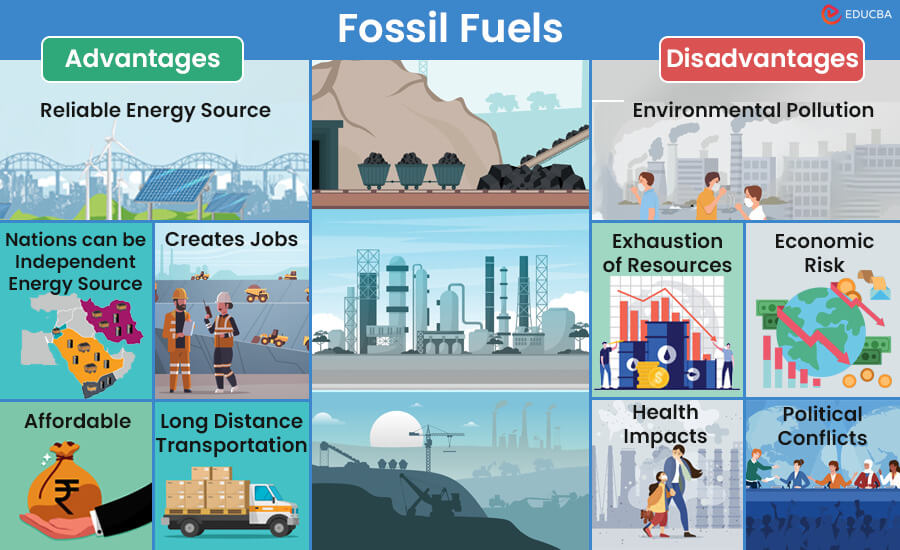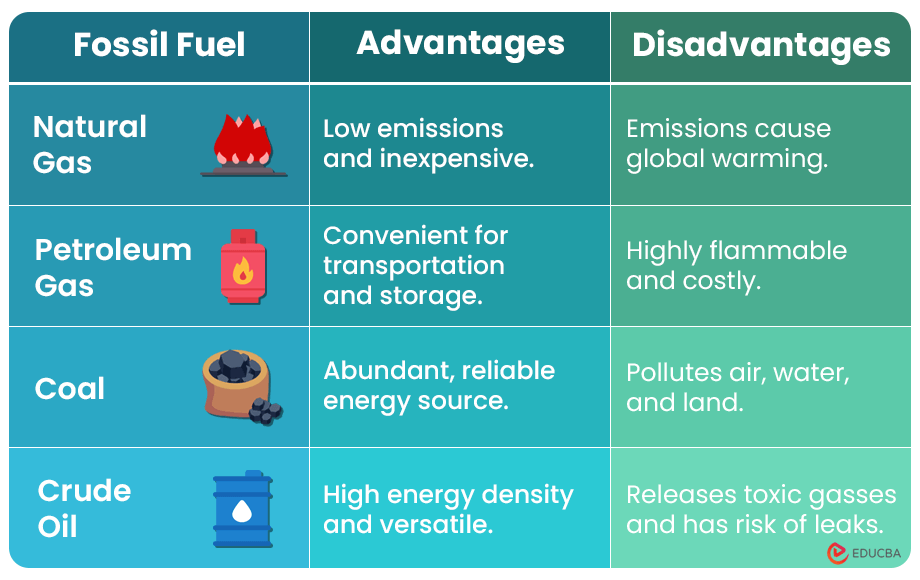
Advantages and Disadvantages of Fossil Fuels – Introduction
Fossil fuels, including coal, oil (petroleum), and natural gas, are energy sources originating from the organic remains of plants and animals. These remains were buried underground for millions of years, transforming them into fossil fuels. They are called ‘fossils’ because they are the fossilized remains of organisms that lived millions of years ago. This article lists the numerous advantages and disadvantages of fossil fuels.
Advantages of Fossil Fuels
The following are a few advantages of fossil fuels:
#1. Acts as a Reliable Energy Source
Fossil fuels provide a steady energy supply. They do not depend on the weather, such as solar or wind power. So, when we need electricity, fossil fuels can reliably produce it, ensuring we have enough power for everything we need in our modern world.
#2. Allows Nations to be an Independent Energy Source
Countries with lots of fossil fuels can use their own fuel instead of buying it from other countries. When a country produces its own fossil fuels, like coal or oil, it can get the energy it needs without depending too much on other nations. This helps them avoid problems like running out of energy or paying more for it when prices change worldwide.
#3. Creates Jobs & Promotes Economic Growth
The economic benefits of the fossil fuel industry are immense, and it contributes significantly to the prosperity of many nations. The fossil fuel industry not only provides many jobs globally but also promotes economic growth, especially in regions like Gujarat and Maharashtra in India, Texas in the United States, Alberta in Canada, and the North Sea in Europe.
People working in this industry are involved in the exploration, extraction, and sale of coal, oil, and natural gas, making a significant impact on the economy.
#4. It is Affordable
Fossil fuels are frequently more affordable than other energy sources due to their abundant reserves and efficient extraction and processing methods. Their widespread availability and well-established infrastructure make them a financially viable choice for individuals and large corporations, providing an affordable energy solution.
#5. Enables Long Distance Transportation
Fossil fuels possess high energy strengths, meaning they contain large amounts of energy per unit of volume or mass. This high energy strength makes them particularly efficient for transportation, allowing vehicles to travel long distances without frequent refueling.
For instance, a gallon of gasoline contains about 31,000 British thermal units (BTUs) of energy, making it a highly efficient fuel for cars and trucks. This efficiency in energy transport is one of the key advantages of fossil fuels.
Disadvantages of Fossil Fuels
The following are a few disadvantages of fossil fuels:
#1. Causes Environmental Pollution
Burning fossil fuels for energy releases harmful substances into the air, leading to severe environmental pollution. For instance, carbon dioxide (CO2) is a major greenhouse gas contributing to global warming. Sulfur dioxide (SO2) and nitrogen oxides (NOx) are also responsible for acid rain, which damages forests, lakes, and buildings. In specific instances, the burning of coal in China has led to the formation of dense smog, causing health hazards and disrupting daily life.
Tiny particles called particulate matter from burning fossil fuels float in the air and can cause breathing problems and other health issues for people and animals. They also lead to haze and acid rain, which harm our health and the environment.
#2. Can Lead to the Exhaustion of Resources
Fossil fuels are finite, and their reserves are depleting with time. This depletion makes extracting them increasingly difficult and costly, leading to environmental issues and conflicts, particularly in ecologically sensitive regions. As per findings from the BP Statistical review, there has been a decline in global coal reserves at an average rate of around 1-2% per year since 2000.
Similarly, oil reserves have also been depleted at an average rate of approximately 1-2% annually over the same period. Given this scenario, shifting to renewable energy sources is critical for a sustainable energy supply and minimizing environmental risks.
#3. Poses Economic Risk
Depending on fossil fuels can pose significant economic risks. As their prices fluctuate, more and more people are switching to cleaner energy like solar or wind power instead. This change in demand could reduce the value of investments in fossil fuels, which may lead to financial losses for individuals and companies heavily involved in these industries.
This risk particularly exists in areas that rely heavily on fossil fuels for jobs and revenue, such as towns with coal mines or oil rigs.
#4. Carries Health Impacts
Burning fossil fuels releases harmful pollutants like sulfur dioxide and nitrogen oxides, causing serious health problems such as asthma and heart disease.
Research from organizations like the World Health Organization shows that millions of premature deaths globally are linked to fossil fuel pollution each year.
This alarming data should serve as a wake-up call, especially for vulnerable groups like children and older people who are at higher risk. It’s high time we consider the health and environmental risks of fossil fuels and start transitioning to cleaner energy sources.
#5. Can Cause Political Conflicts
Political instability in regions abundant in fossil fuel reserves often sparks conflicts over the control and distribution of these resources.
The Middle East is a prime example, where significant oil reserves have fueled geopolitical tensions for many years. Over-dependence on fossil fuels can worsen disputes between countries, leading to conflicts and injustices against local communities in resource-rich regions.
Advantages and Disadvantages of Different Fossil Fuels
Here is a snapshot of the pros and cons of different fossil fuels:
Final Thoughts
In considering the advantages and disadvantages of Fossil Fuels, it is clear they offer affordability and reliability, aiding our economic growth. However, burning them pollutes the environment, contributes to climate change, and harms our health. Plus, they are not infinite resources. To navigate this, we must find cleaner energy sources and use fossil fuels more wisely. It is about striking a balance between the benefits they bring and the harm they cause, all for a better future.
Recommended Articles
We trust you will find this EDUCBA information on the “Advantages and Disadvantages of Fossil Fuels” useful. For similar content, view EDUCBA’s recommended articles.

